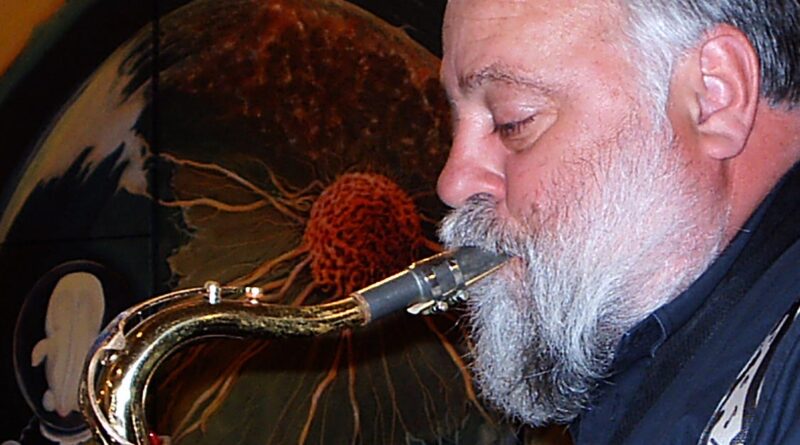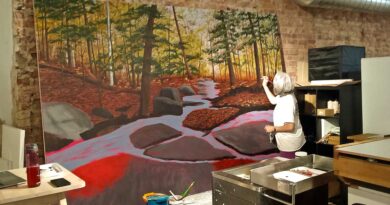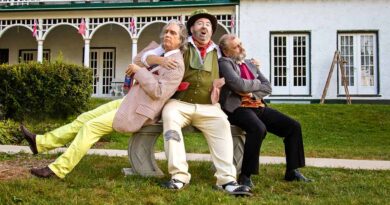Remembering Suds Sutherland: September 24, 1945 – December 26, 2024
By John Swartz
The loss of prominent people in the community always brings out a flood of condolences. The loss of a music teacher/musician creates a tsunami of messages, remembrances and stories.
Such is the case with Bruce Sutherland. He died on Boxing Day. We all knew him as Suds. Even his family knew him as Suds. He said he acquired the nickname when he was 3-years-old and it’s not an uncommon nickname for people with the surname Sutherland. I suppose there are people who never knew his name was Bruce.
I was never a student of Suds’s, not in the formal sense. I still learned a lot about music from him, and a lot about the musical history of this little town. I feel like many of those who were his students in school and afterward; there is a deep sense of personal loss, and the feeling of loss to time for the community of Orillia that he will not get on a stage again, will not give some off-hand advice to another musician.
Suds studied music at the University of Toronto. He was a member of the U of T’s first jazz ensemble. Roy Menagh was his roommate from 1965 to 1968.
Suds’s entry into Orillia’s culture began in 1969 when he started teaching at Park Street Collegiate with Stan Passfield. In 1972 he moved over to Twin Lakes Secondary School where he remained until he retired in 2003. That sounds like a prison sentence; it was anything but.
He recalled he had 140 students taking classes, adding nowadays once class enrollment reaches 90 another music teacher is hired. There was another music teacher, Ross Arnold, and together they turned out scores of musicians who over the years have played in front of audiences here and there.
“I’ve got a list someplace that has about 76 names, I think, on it of people that I taught who made their living like I do out of music,” Suds once said.
Christopher Simmons has a full-time career as a pianist. Steve McEown and Steve Eyres, Ronnie Douglas, Steve Dyte and countless others were taught by Suds.
Some of his students became music teachers; Dan Austin, Steph Dunn, Aaron Duncan and who knows how many others in the education system or teaching privately there are.
Not content to just teach music, there were years when it came time to plan the annual student musicals he decided to write one for the kids rather than do some old stock play.
“There are no royalties to pay – we wrote it,” Suds said of the school’s 2000 production, Wurlitzer. We is Suds and fellow teacher Dave Austin. Dave wrote the story and lyrics, Suds the musical notes.
That year was the second time they put that play on stage, but Dave re-wrote, updated, the script from its 1995 run, and Suds added some new songs.
It was back to the pad of music paper in 2001 when they wrote Imagination for the students. As writers they had some commentary to make, and maybe a little crystal ball gazing. From the story published about the play:
“Set in the year 2020 the play takes a look at the future of education in light of cutbacks and curriculum changes that Austin thinks will stifle creativity. Increased infiltration of corporate sponsorship and advertising also becomes part of the scenery in Austin’s school of the future.”
From conversations with Suds over the years I know he would be completely on board with that philosophy.
They did it again in 2002 with The Glass Slipper. Laura Kelly, who has her own career as a classical soloist, was one of the leads in the play.
In 2003 it was time to not work so hard, so they created a new play with a new script and some old music for Saying Goodbye to Rock On High, a review of their previous 5 plays (which also included Wildwood Summer and Rock On High Reunion).
I remember seeing all but Wildwood. They were very well done from conception to performance. It must have been exciting to create those plays when you know you have the talent to carry out the vision. It also must have been exciting for the cast and crew, knowing they were doing something no other school was doing – original material.
That’s the thing with people like Suds (and Dave and Ross). It’s not enough to teach the notes on the page and have them played back reasonably well. It’s about finding the inner musician students have and bringing that to into the light of day in a way the student’s own personalities become part of the performance, separating the musicians from the players. It is about unleashing something onto the world the world would not expect and enjoy. All the good music teachers also play in public regularly, and are proud to be able to make others happy with the execution of their craft, but are immensely more proud when one of their students gets the accolades.
Suds was proud of his school bands and of his students that would become professional musicians, and professional amateurs. We have been enjoying the latter’s work for years with the Orillia Concert Band, The Cellar Singers, The Orillia Silver Band, Mariposa Arts Theatre and many other one-offs.
I remember once I was wearing a t-shirt with the logo of the Santa Clara Vanguard on it. I was very surprised when Suds commented he’d seen them and knew how good that drum corps is. It turned out he and Ross had been going to drum corps shows for years, and in fact had been at some of the same shows I had been to.
That moment opened up a door. We had something in common besides knowledge of popular and classical music, a deeper knowledge of understanding between us of what it takes to become not just a proficient musician, bet a great musician We could talk to each other with a different vocabulary about music.
I always informed my opinion of other musicians by if, or how much, they knew about Tower of Power. It never struck me Suds would not know about that band because of the kind of music he played in his own bands. But it may have changed his opinion of me.
We could talk at length about the intricacies of certain recorded performances knowing we understood each other’s shorthand. I remember once being over to Sud’s, we were having a drink and he asked if I ever heard the West Avenue Band. I hadn’t.
He rummaged around in a cabinet and cued up a tape and played some of their excellent music. This was Sud’s band before my time in Orillia began. In it were Louis LeFaive, Rick Patenaude, Charlie Hinkle, and Mike Roberts. I also think Brian Boyd was playing drums in the band. What a time that was to listen to some smoking hot musicianship and having Suds beaming away at the fruit of his labour being appreciated as I was doing.
Of course most people have memories of The Sensations, a band that could pack a venue and set the audience on fire with their Rock/Blues/Jazz/R&B/Soul music. Without a doubt they were the top band in our area for decades until they packed it in.
One of the things about being a busy musician is you work New Year’s Eve. Suds once mentioned he played his first when he was 16 years old and that he could only remember not playing a NYE only 5 times in his professional life.
He also had other bands; Johnny Flamingo and the Living Room Experience, Slow Hand Walter and a band he virtually created out of thin air, Gearl Jam.
The latter was all girls on all instruments and vocals, except for Suds playing keyboards. He had to teach Marie Helene Sutherland, Erin Morris, Tamara Smith, Linda and Penny Lambert how to play the songs they would do. They played a number of gigs. He was to this band as Garth Hudson was to the members of The Band before they became The Band, a member and their tutor.
I recall I saw them twice and as musicians would say to one another, they didn’t suck. Suds made a band out a group of people who had ambition to be a rock band.
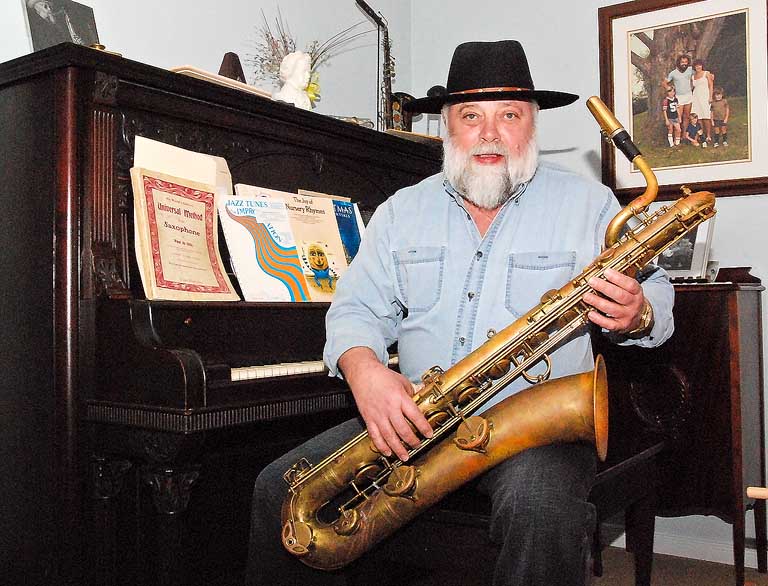
Of course, most people knew Suds played saxophone (all of them), but he also played a couple dozen other instruments well enough to do it publicly. I have often daydreamed about being able to play the sax. I think it’s the most expressive instrument there is. I also daydream about being able to play Harlem Nocturne, a tune that begs for a sax.
I got to hear him play that song at an Orillia Wind Ensemble concert in 2012. Man it was sweet. As great as it was, in the second half he played Summertime, completely as a solo without the band’s participation. In the review I wrote:
“I think that was probably the most dramatic thing that could have been done and to me was the best moment of the concert.”
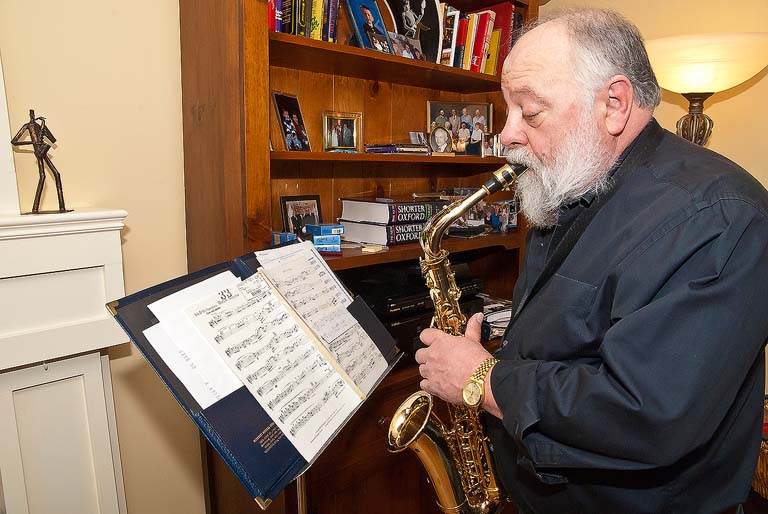
That concert also featured two pieces of music Suds wrote for the OWE, A Taste of Austin and Sutherland, which is a suite of music drawn from the plays he wrote for Twin Lakes students, and the Plunkett Suite.
Before expanding on the Plunkett Suite, I have to mention another great performance I witnessed. It was at the Jazz Festival, also in 2012.
Sidenote: it was Sud’s idea to make a festival Ralph Cipolla was trying to get off the ground to be a jazz festival.
The name on the marquee at the Opera House was Ron Westray’s band. The trombonist bandleader already had 3 saxes on stage (including Richard Underhill and Ryan Oilver, both of the Shuffle Demons) when he invited Suds’ to join them to play Sonny Rollins’s Tenor Madness. The crowd went nuts over the extended solo duet between Suds and Ryan.
Writing a piece of music as a tribute to another musician takes some great care and creativity. The Plunkett Suite is in four parts, each in a style corresponding to a period of Bob Plunkett’s life.
The first was subtitled The Majesty of Canada reflecting on Bob’s deep love of the country. Next is The Dance Hall in honour of a place where Bob met his future wife, Gladys. Third is Coast to Coast, reflecting Bob’s time as music director for the HMCS York Navy Band and the last was in a march style. When Bob was conductor of the Orillia Concert Band, each concert included a march, usually as the final piece of an evening’s program. Of course it got a standing ovation.
Suds was selfless. You almost have to be to be a music teacher. There are too many students stuck on a passage that need help, or can’t get over a hurdle developing a playing technique – always after office hours, or as we saw above helping a group of girls get on stage because they were tired of never seeing any females playing at the concerts they went to.
In 2006, I was asked to play at the annual Joint Effort concert. I was excited to be asked. There was one problem, I would have to write a solo piece (playing some stock arrangement would never do) and then practice it until I could play it in my sleep and I had no such place to do any of that. I’m a drummer, who wants to hear a drummer practice?
I must have said something within earshot of Suds. I recall Suds without hesitation said, “you can use my garage.” His garage was converted to a music rehearsal room, sometimes a performance space. He said to come over and have a look. He showed me how to get in, where to park and said come over every day if you need to. I did, it was in my neighbourhood, which made things even better. For about two, maybe three, weeks I used his garage for a couple hours each time. He never complained. He even came out once to have a listen and critique of what I put together. I was grateful for that, and have remained so ever since.
I am going to miss Suds’s smile, the twinkle he got in his eye when he was about to say something humourous, and his laugh. It’s difficult to think I will no longer run into him at the grocery store down the street. Some of his music will never be heard again except as we replay it from our memories, but then some of it will live on too.
A celebration of life and musical jamboree will happen in the spring and I’ll be sure to have the details in my column.
(Photos by Swartz – SUNonline/Orillia) Main: Suds Sutherland: September 24, 1945 – December 26, 2024 in a photo from 2006 for the Packet & Times.

